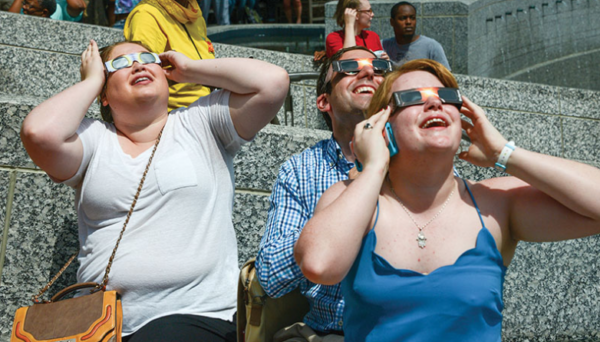People who save everything should be in the catbirds seat on Saturday, Oct. 14, when Greensboro will experience a partial solar eclipse.
On Monday, Aug. 21, 2017, the last time there was a nearly total solar eclipse in Greensboro, you couldn’t walk 10 feet in downtown Greensboro without somebody offering you a pair of eclipse viewing glasses. The question, even for people who save everything is – Where did I put those flimsy cardboard glasses?
However, if you can find them and they are still in good shape, they should provide the protection your eyes need for the partial solar eclipse on Saturday and you do need protection. It isn’t safe to look directly at an eclipse without proper eye protection because the sunlight can damage your eyes.
According to the current weather report, most of us won’t be needing protective glasses because, much like in 2017 – when the nearly total solar eclipse was obscured by clouds – Saturday around noon when the solar eclipse will take place there is a 50 percent chance of rain, and it looks like about a hundred percent chance of clouds.
The solar eclipse will begin at 11:53 a.m., reach its maximum coverage of about 40 percent at 1:17 p.m., and end about 2:45 p.m.
To see the total annular eclipse, where the light from the sun forms a ring around the moon, you need to travel to Texas, New Mexico, Utah, Nevada, California or Oregon and pick a site in the path of the eclipse that is not going to be cloudy.
In 2017, while it was overcast in downtown Greensboro for most of the eclipse, the sun did peak out between the clouds for about 30 seconds – enough time to see part of the sun obscured by the moon, but nowhere near the 94 percent coverage that people were hoping to see.
For those serious about seeing the partial eclipse, the High Point University Department of Physics and Astronomy is hosting a viewing on Saturday, Oct. 14 from 11:45 a.m. to 3 p.m. at the Wanek School of Natural Sciences at One University Parkway in High Point. The event is free and people are advised to use the HPU campus entrance at the intersection of Qubein Avenue and North Centennial Street.
Telescopes with solar filters and eclipse glasses will be available for people who can’t find their glasses from 2017 to safely view the eclipse.

